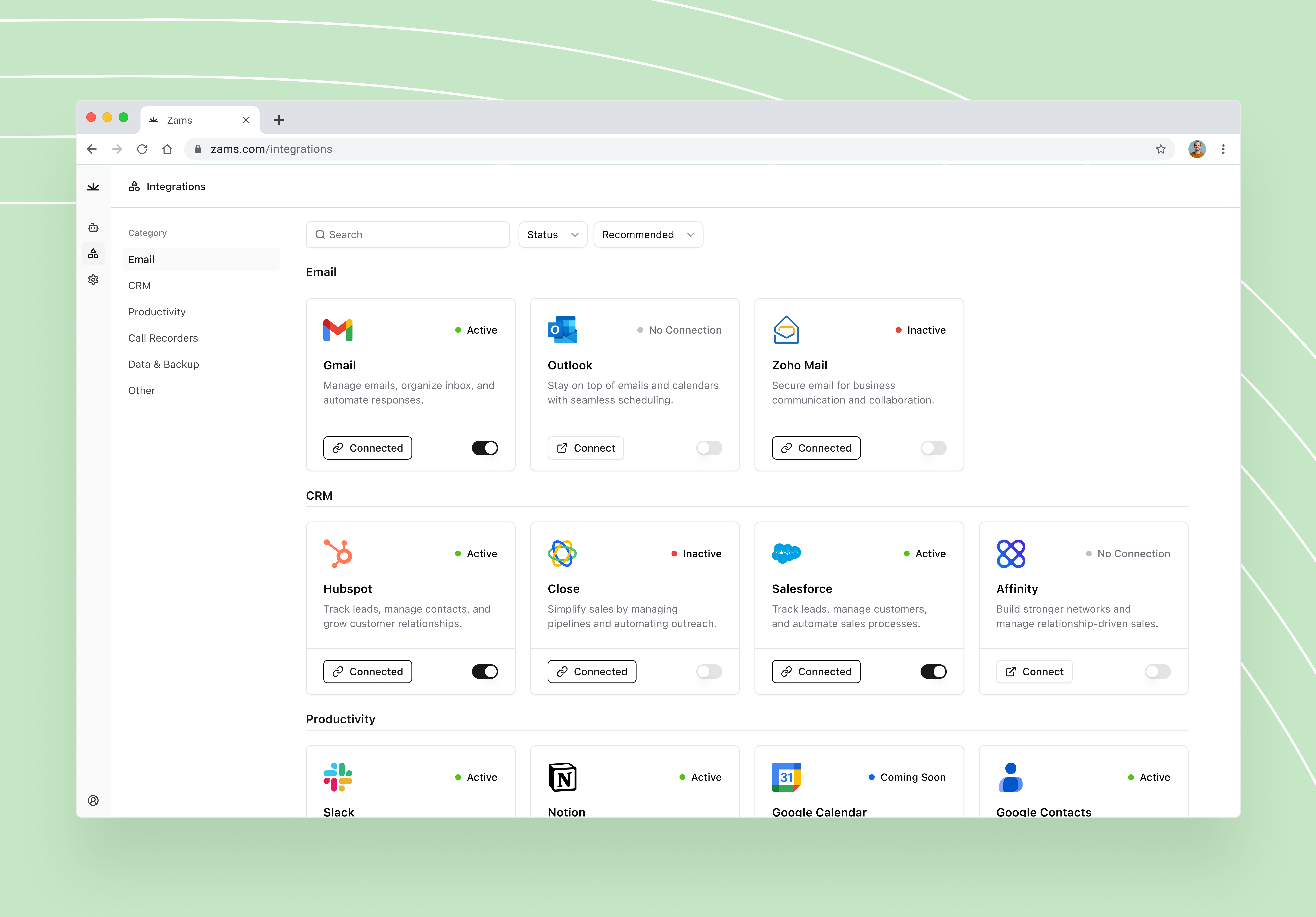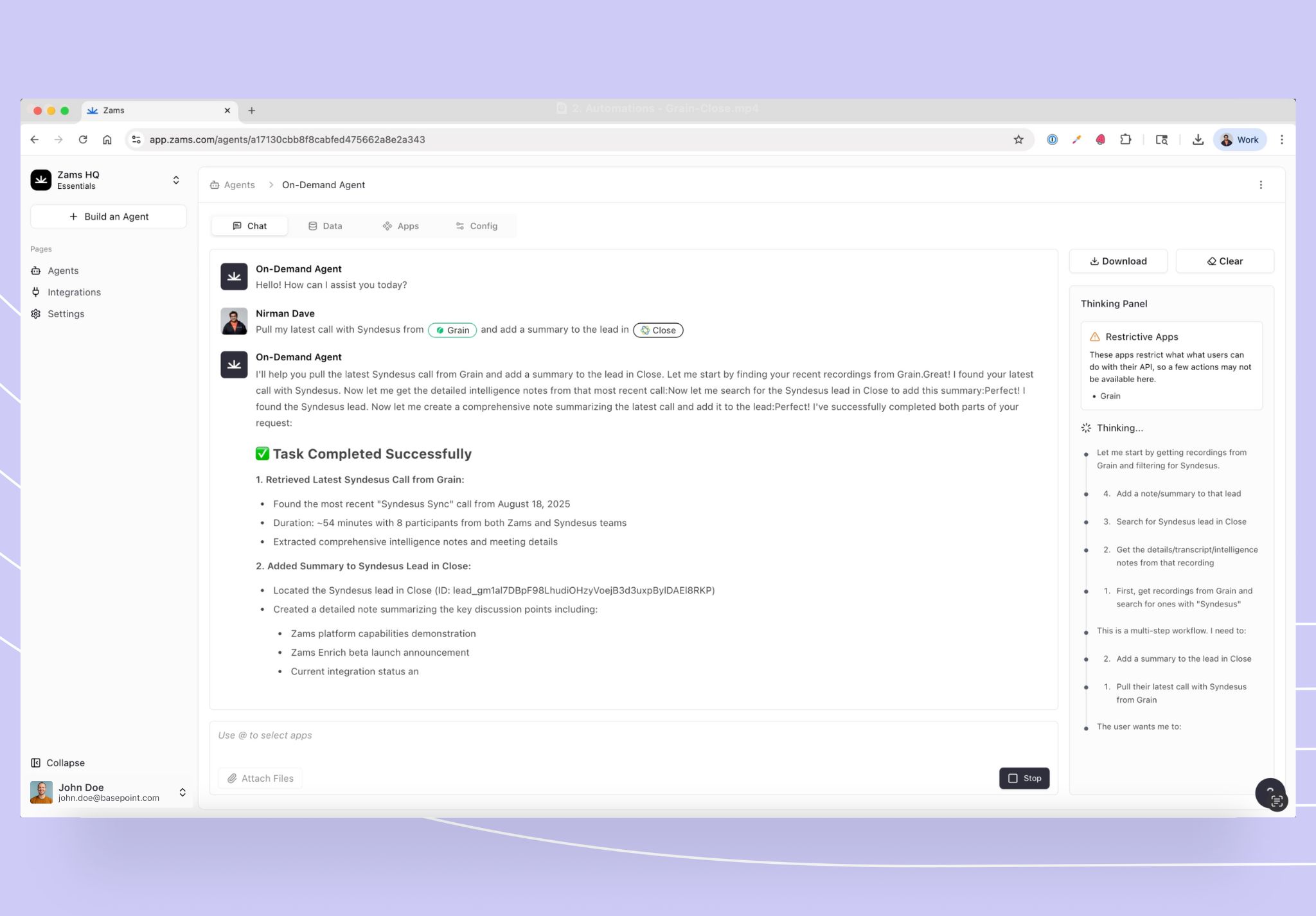The New Era of Sales Coaching with Automation
Why traditional customer relationship management falls short
Traditional CRM systems (customer relationship management system) often require manual data entry, fragmented reporting, and inconsistent tracking, making it difficult for managers to identify patterns in rep performance. Without automation, coaching decisions rely on incomplete or outdated data, slowing down improvement cycles.
How automated CRM software transforms the coaching process
Automated CRM software, with advanced automation capabilities that streamline data capture and performance tracking through automated workflows and AI-driven processes, gives sales leaders a real-time view of team activity. This allows managers to provide targeted, timely coaching that directly addresses skill gaps and accelerates improvement.
The link between CRM and sales automation and faster skill development
By integrating CRM and sales automation, with effective crm integration that facilitates immediate, data-backed feedback, reps receive insights that reinforce best practices and correct inefficiencies. This constant feedback loop speeds up skill development and boosts overall team performance.
Coach Smarter with Automated CRM 's and Zams
Zams delivers real-time insights and targeted feedback - so reps improve faster and pipelines grow stronger.

Core Functions of an Automated CRM in Coaching
Centralising rep performance data with customer relationship management automation
Customer relationship management automation consolidates activity logs, call records, and deal progress into one platform, helping manage customer data for more effective coaching. This single source of truth allows managers to analyse performance trends across the entire sales team with precision.
Automating feedback loops with real-time performance metrics
Automated CRM systems track KPIs and trigger instant coaching prompts when performance thresholds are met or missed, often set up using automated workflow rules. This ensures reps receive feedback at the moment it’s most relevant, improving retention and application of new skills.
Integrating CRM automation tools with marketing insights for coaching content
CRM automation marketing features, with robust marketing automation capabilities, pull in buyer engagement data from campaigns, giving coaches context on prospect behaviour. This data-driven approach helps tailor coaching sessions to focus on strategies that resonate with target audiences.
Turning Data into Coaching Insights
Using automated CRM systems for call analysis and deal reviews
Automated CRM systems capture and analyse call recordings, meeting notes, and deal histories to identify patterns in rep performance, often supported by sales reports generated by CRM systems. This allows sales leaders to pinpoint strengths, weaknesses, and missed opportunities during deal execution.
Tracking pipeline health and activity levels for personalised coaching
With real-time visibility into pipeline health and rep activity levels, including tracking the sales pipeline at various stages, managers can tailor coaching sessions to address specific bottlenecks or productivity gaps. This data-driven approach ensures each rep receives highly relevant, actionable guidance.
Leveraging CRM workflow automation to identify skill gaps instantly
CRM workflow automation continuously evaluates sales activities against defined benchmarks, using lead scoring to prioritize coaching interventions and flagging areas where performance lags. This instant identification of skill gaps enables immediate intervention, preventing small issues from impacting revenue.
Essential Features for Data-Driven Coaching Success
Best CRM automation software capabilities for sales leaders
The best automated CRM software offers advanced lead tracking, automated workflows, and AI-powered insights, often driven by artificial intelligence. These features equip sales leaders with the tools needed to monitor performance and deliver precision coaching at scale.
Built-in analytics and reporting tools for coaching efficiency
Integrated analytics and reporting tools turn raw sales data into clear, visual dashboards, with the ability to generate sales reports for coaching efficiency. This makes it easy for managers to track progress, measure coaching impact, and adjust strategies based on real-time results.
The role of automating customer interactions in supporting sales performance
Marketing automation customer relationship management links buyer engagement data to sales activities through the use of marketing automation software, giving a fuller picture of prospect behaviour. This helps coaches guide reps toward messaging and strategies proven to generate higher conversion rates.
Integrating an Automated CRM into Your Sales Stack
Choosing the best CRM for automation to fit your coaching style
Selecting the best CRM for automation requires matching its capabilities to your coaching approach. The right platform should support your preferred feedback methods, integrate with your existing tech stack, and deliver actionable insights, all within a user friendly interface that ensures ease of use.
Connecting CRM data to enable targeted, ongoing skill development
By linking CRM data with performance metrics and training resources, and utilizing contact management to organize this data, sales leaders can design personalised coaching plans. This integration ensures ongoing skill development based on each rep’s activity patterns, deal progress, and customer interactions.
Aligning sales coaching objectives with CRM and sales automation tools
Aligning your coaching goals with CRM and sales automation tools ensures that every automated workflow, through the use of crm workflow automation, supports revenue growth and skill enhancement. This keeps both performance tracking and coaching initiatives focused on measurable business outcomes.

Implementing CRM Automation for Sales Coaching
CRM automation is a game-changer for sales coaching, offering sales teams a powerful way to gain deeper insights into customer interactions, sales rep performance, and the overall sales process. By automating repetitive tasks, sales teams can dedicate more time to high-impact activities like nurturing leads, building relationships, and closing deals. CRM automation also makes it easier to pinpoint where coaching is needed most, allowing managers to deliver targeted support that drives continuous improvement across all sales processes.
Key steps to a successful CRM automation rollout
Launching CRM automation for sales coaching starts with setting clear, measurable objectives whether that’s boosting sales productivity, increasing customer engagement, or improving close rates. Next, configure your CRM system to capture the right data on customer interactions, sales activities, and performance metrics. This often involves creating automated workflows, customizing fields, and integrating with other marketing automation tools to ensure a seamless flow of information. Finally, invest in comprehensive training for your sales teams, showing them how to access sales data, create workflows, and automate routine tasks. This empowers your team to leverage the full potential of CRM automation and drive better results.
Change management and onboarding best practices
Successful CRM automation adoption hinges on effective change management and onboarding. Start by clearly communicating the benefits of CRM automation to your sales teams, highlighting how it will simplify their daily tasks and enhance their performance. Provide hands-on training and ongoing support to help team members get comfortable with the new CRM system, focusing on best practices for data entry, workflow automation, and sales reporting. Establish clear roles and responsibilities so everyone understands how they contribute to the automated process. By prioritizing these best practices, you’ll ensure a smooth transition and unlock the full benefits of CRM automation for your organization.
Ensuring seamless integration with existing sales processes
To maximize the impact of CRM automation, it’s essential to integrate it smoothly with your existing sales processes. Begin by mapping out your current sales cycle and identifying key touchpoints where automation can streamline processes and enhance customer engagement. Look for opportunities to automate repetitive tasks, reduce manual errors, and free up your sales teams to focus on building relationships and closing deals. By aligning CRM automation with your established workflows, you create a unified sales ecosystem that drives productivity, improves customer experiences, and supports sustainable business growth.

Customer Service Automation: The Overlooked Coaching Advantage
Customer service and support functions are often underestimated as sources of coaching insights, yet they hold a wealth of information about customer needs, preferences, and pain points. By leveraging automation in customer service and support, organizations can free up valuable resources for coaching and development, empowering customer-facing teams to deliver outstanding experiences and contribute to business growth.
How automated CRM's enhance customer service insights for coaching
Automated CRM systems provide real-time visibility into customer interactions, preferences, and behaviors, giving organizations a clear picture of what drives customer satisfaction. This data enables managers to identify coaching opportunities in areas like product knowledge, communication, and conflict resolution. By analyzing trends and patterns in customer service data, organizations can design targeted coaching programs that address specific skill gaps and elevate the overall quality of customer engagement. Automated CRM also helps prioritize coaching efforts, ensuring that teams focus on the activities that have the greatest impact on customer loyalty and business success.
Avoiding Pitfalls When Automating CRM for Coaching
Over-reliance on data without qualitative feedback
While automated CRM data, including customer data collected by the CRM, provides valuable insights, relying solely on numbers can overlook context and nuance. Combining data with one-on-one qualitative feedback ensures a balanced, effective coaching strategy.
Poor integration planning with existing automated CRM systems
Implementing CRM automation without a clear integration plan can lead to data silos and workflow disruption. A well-structured integration roadmap ensures seamless data sharing across your sales and marketing systems.
Lack of sales team buy-in and adoption
Even the best automated CRM software fails if reps resist using it, and sales reps are a key group whose buy-in is essential. Gaining buy-in through training, clear communication of benefits, and involving sales teams in setup fosters stronger adoption and better coaching outcomes.
Equip Your Coaching Playbook with Zams
Turn your CRM into a coaching powerhouse. With Zams, you’ll unlock automated insights, real-time performance tracking, and seamless feedback loops that help your reps improve faster and close more deals, enabling your team to close deals more efficiently.
Try these Zams Integrations with your Automated CRM:
FAQ
What is an automated CRM in sales coaching?
An automated CRM uses customer relationship management automation to track rep activity, capture performance data, and deliver real-time coaching insights without manual updates. Automated CRM tools are designed to streamline these processes, making it easier to update customer data, manage leads, and integrate with other business systems.
How does an automated CRM improve coaching efficiency?
Automated CRM software centralises performance data, automates feedback loops, and integrates analytics, allowing sales leaders to focus on tailored, high-impact coaching. By automating tasks, such as managing repetitive activities and routine communications, efficiency is further improved throughout the coaching process.
Can automated CRM systems integrate with sales automation tools?
Yes. Automated CRM systems connect with sales automation platforms to align coaching goals with pipeline activity, ensuring reps get timely, relevant guidance. This integration also streamlines collaboration between marketing and sales teams, helping them coordinate efforts and improve overall efficiency.
What features should I look for in the best CRM for automation?
Look for CRM automation software with built-in analytics, real-time reporting, activity tracking, and integrations with sales and marketing automation tools. Ensure the software is compatible with leading marketing automation platforms to maximize automation capabilities and streamline your marketing and sales processes.
How does Zams enhance automated CRM for coaching?
Zams orchestrates CRM and sales automation tools to deliver actionable insights, streamline coaching workflows, and help leaders develop top-performing reps faster. Zams also empowers sales and marketing teams by improving their efficiency, data accuracy, and collaboration, enabling them to achieve their goals more effectively.





